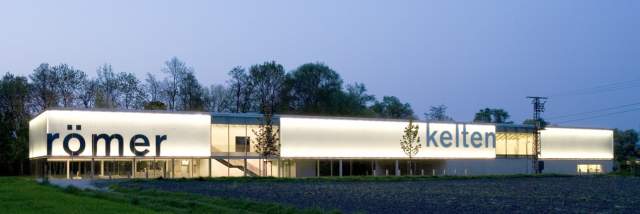In Poseidon's Realm XVIII
2013 | 15.3.-17.3.2013 Manching
Logistics of the Roman Empire and the Roman fleets

In Poseidon' Realm XVIII took place from March 15, 2013 to March 17, 2013 in cooperation with the kelten römer museum manching (branch museum of the Archaeological State Collection Munich). Under the Topic of “Navigare necesse est, vivere non est necesse - The providing of Rome and its provinces with food, commodities and soldiers. Logistics of the Roman Empire and the Roman fleets – 23 scientists from 11 different countries presented and discussed their papers.
 The extensive support programme not only provided a way for ship historians for a detailed study of the almost perfectly preserved Roman military ships from around 100 AD, but the whole exhibition was of great interest to everyybody interested in archaeology. The excursion to the find spot of the ships gave insight into the geographic changes of the waterways since Roman times. The guides tour through the museum, the educational center and the archives and a cookery course "Roman Cooking" completed the pogramme.
The extensive support programme not only provided a way for ship historians for a detailed study of the almost perfectly preserved Roman military ships from around 100 AD, but the whole exhibition was of great interest to everyybody interested in archaeology. The excursion to the find spot of the ships gave insight into the geographic changes of the waterways since Roman times. The guides tour through the museum, the educational center and the archives and a cookery course "Roman Cooking" completed the pogramme. In the run-up of the conference the DEGUWA organized a NAS-course "Managing Archaeology" Specialists conveyed their knowledge on public relations, fundraising, project management und publishing. |
 |
| Sektion 1 – Frühzeit und Republikanische Zeit | |
 |
Clarissa Belardelli
Die überfluteten und an der Küste gelegenen Plätze frühgeschichtlicher Zeit nördlich Roms. |
 |
Julia Daum
Pyrgi und seine Nachbarn – Der Wandel der tyrrhenischen Häfen in etruskisch-römischer Zeit. |
 |
Jonas Enzmann
The shift of trade routes across the English Channel during the Roman expansion in Western Europe. |
 |
Michele Stefanile
Lead ingot cargoes from Carthago Nova to Rome. Some remarks on the presence of people from Campania in the exploitation of Iberian mines. |
 |
Justin Leidwanger
Integrating an Empire: Maritime Trade and Agricultural Supply in Roman Cyprus. |
 |
Constantin Müller
Ägyptisches Getreide für Rom. Nahrungs- und Machtquelle. |
| Sektion 2: Frühe und Mittlere Kaiserzeit |
|
 |
Massimo Capulli
Ships of Aquileia. Underwater Archaeological Research for the study of marine and inside routes in the Upper Adriatic Sea. |
 |
Jean-Yves Blot – Sonia Bombico
Historical and marine context of a Ceramics assemblage in a Shipwreck at Cortiçais (Peniche, Portugal): a glimpse into the early Imperial Roman Atlantic trade. |
 |
Gil Gambash
Caesarea Maritima and the Grand Strategy of the Roman Empire. |
|
Octavian Bounegru
Roman transport ships in the Marcomanic Wars on the Lower Danube limes. |
|
| Sektion 3: Späte Kaiserzeit und Spätantike |
|
|
Thomas Schmidts
Die gallischen Schiffseigner und der römische Staat. |
|
 |
Igor Mihajlović
Sutivan, a Roman period shipwreck with cargo of sarcophagi and stone. |
 |
Norbert Hanel – Peter Rothenhöfer – Michael Bode – Andreas Hauptmann Britannisches Blei auf dem Weg nach Rom – Die Metallversorgung der Metropole am Beginn der Herrschaft des L. Septimius Severus. |
| Abendvortrag |
|
 |
Ronald Bockius Warenarten und Ladekapazitäten. Überlegungen zu den Besonderheiten römischer Handelsschiffe im Mittelmeer und den römischen Provinzen. |
| Sektion 3: Späte Kaiserzeit und Spätantike (Forts.) |
|
 |
Katerina Dellaporta
SYRNA I: A III c. AD coins shipwreck. |
 |
Igor Miholjek, Luka Maljić
The Shallows of Lučnjak: An Adriatic Shipwrecking Point through the Centuries. |
 |
Martina Čechová
Food-supply from Tauric Cherson in Late Antiquity and the Early Middle Ages: Products and Transportation. |
Sektion 4: Aktuelles und Miscellanea |
|
 |
Vesna Zmaik
Medieval Byzantine shipwrecks in the Eastern Adriatic. |
Paul Montgomery
The post medieval maritime intertidal landscapes of Lough Swilly and Lough Foyle. |
|
 |
Mike Belasus
Das Pilotprojekt “Bedrohtes Bodenarchiv Nordsee”. |
|
Massimiliano Ditta |
|
 |
Eva Kareli
Reconstructing the Bremen Eke. |
 |
Leon Ziemer
Vom Seeungeheuer verfolgt? Zwischen Fiktion und Realität der Gefahr zu hoher See. |




